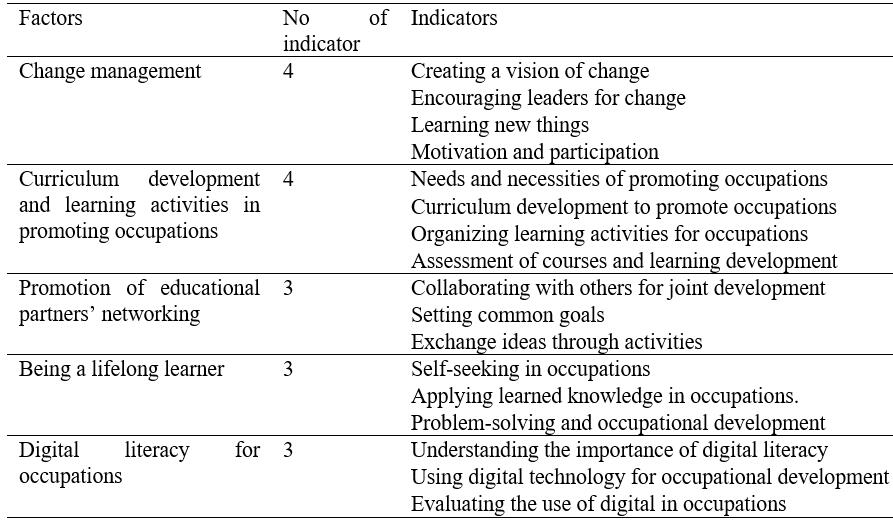Policy Recommendation for Educational Management to Promote Occupations in the Community Learning Centers for Non-Formal and Informal Education
Abstract
This study was planned to investigate the current and desirable conditions of educational management to promote occupations in the community learning centers for non-formal and informal education using needs assessments. A sum of 423 respondents encompassed 184 school administrators and 239 teachers participated in the survey using a stratified random sampling method. A questionnaire consisted of 47 items was used as the research instrument. Data were analyzed using mean scores, standard deviation, and priority needs index modified. The study results showed that the overall current state was at a high level (mean score=3.53) while the desirable condition was at the highest level (mean score=4.41), respectively, for educational management to promote occupations in the community learning centers for non-formal and informal education. Finally, the needs assessment results indicated that the highest priority was the change management factor (PNImodified=0.403), followed by curriculum development and learning activities in promoting occupations factor (PNImodified=0.254), promotion of educational partners’ networking factor (PNImodified=0.247), and being a lifelong learner factor (PNImodified=0.206). The lowest priority index of needs was digital literacy for occupations (PNImodified=0.161). The results contribute significantly to knowledge with regard to needs assessments which will be the reference for educational managers and teachers to understand how to promote occupational education.
References
Berger, N. O. (n.d.) Needs assessment in human resource development. Human Resources and their Development, Vol.1 in Encyclopedia of Life Support Systems. Retrieved from Needs Assessment in Human Resource Development (eolss.net)
Boonchom, S. (2013). Preliminary research (9th ed.). Bangkok, Thailand: Suveeriyasan.
Martiskainen, M. (2017). The role of community leadership in the development of grassroots innovations. Environmental Innovation and Societal Transitions, 22(2017), 78-89. https://doi.org/10.1016/j.eist.2016.05.002
Non-formal Education Commission ONFEC. (2005). Report on the supervision of the program of developing CLCs as life-long learning centers. Bangkok, Thailand: Education’s Supervisor Unit
Office of the Promotion of Non-formal and Informal Education. (2012). Continuing educational management guide. Bangkok, Thailand: Rangsit printing.
Onyx, J., & Leonard, J. R. (2011). Complex systems leadership in emergent community projects. Community Development Journal, 46, 493-510. https://doi.org/10.1093/cdj/bsq041
Pilcher, J. (2016). Learning needs assessment: Not only for continuing education. Journal for Nurses in Professional Development, 32(4), 185-191. https://doi.org/10.1097/NND.0000000000000245
Riley, K. (2012). Walking the leadership tightrope: Building community cohesiveness and social capital in schools in highly disadvantaged urban communities. British Educational Research Journal, 39, 1-21. https://doi.org/10.1080/01411926.2012.658021
Sullivan, H. (2007). Interpreting ‘community leadership’ in English local government. Policy Politics, 35, 141-161. https://doi.org/10.1332/030557307779657775
U.S. Department of Education. (2018). 21st century community learning centers. Retrieved from 21st Century Community Learning Centers (ed.gov)
Uhl-Bien, M., Marion, R., & McKelvey, B. (2007). Complexity leadership theory: Shifting leadership from the industrial age to the knowledge era. Leadership, Q.18, 298-318. https://doi.org/10.1016/j.leaqua.2007.04.002
UNESCO office Bangkok and Regional Bureau for Education in Asia and the Pacific. (2008). Community learning centers: Country report from Asia. Bangkok, Thailand: UNESCO Asia and Pacific Regional Bureau for Education.
Zanbar, L., & Itzhaky, H. (2013). Community activists’ competence the contributing factors. Journal of Community Psychology, 41, 249-263. https://doi.org/10.1002/jcop.21527


This work is licensed under a Creative Commons Attribution 4.0 International License.
Copyright for this article is retained by the author(s), with first publication rights granted to the journal.
This is an open-access article distributed under the terms and conditions of the Creative Commons Attribution license (http://creativecommons.org/licenses/by/4.0/).








1.png)

















